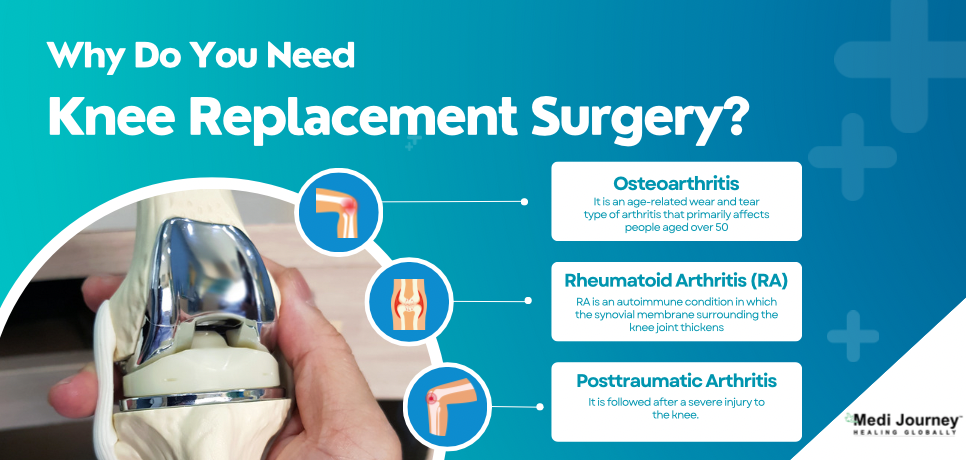The Role of Government Initiatives in Promoting Medical Tourism in India
 02 April,2025
Read More
02 April,2025
Read More
Enquire now in case of any assistance needed

Are you suffering from knee pain that has limited your range of motion? Are you unable to enjoy your life to the fullest because of severe knee pain? Have medications stopped working for you? If the answer to any of these questions is yes, you might require knee replacement surgery.
After a certain age, the bones and cartilage become damaged and stop working as they should. Replacing the worn-out joint with a prosthetic one is the most suitable option. But just age is not the criteria for knee replacement anymore. The procedure has seen significant improvement after the first knee replacement surgery in 1968. Over 1 million knee replacement surgeries are now done annually worldwide.
This article is a complete guide that will help you learn about various types of knee replacement surgeries, their indications, procedures, and how to recover.
Knee arthroscopy is better known as knee replacement surgery. The word arthroscopy means repairing the joint surgically. Knee replacement surgery involves reconstruction and replacement of the degenerated/deteriorated knee joint using prosthetics or artificial joints.
The knee joint consists of three bones: the femur (thighbone), tibia (shinbone), and patella (kneecap). Soft tissues like muscles, tendons, and ligaments keep the knee joint intact and help with movement. The meniscus is the cartilage cushion between the bones that helps absorb shock.
Depending upon the severity of your condition, the surgeon might recommend either of the following knee replacement surgeries.
A knee replacement surgery is the last sought option for people experiencing severe knee pain. There can be numerous reasons for knee pain, but the most common ones are –
Apart from the conditions mentioned above, the orthopedic surgeon recommends knee replacement surgeries for patients with –
A knee replacement surgery is usually done when medical treatments like pain medicine, anti-inflammatory medicines, cortisone injections, glucosamine supplements, physical therapy, use of walking aids (cranes), weight loss, etc., are no longer beneficial to the patient.

Knee replacement surgery is a one to two-hour process done under general anesthesia. On the day of the procedure, a healthcare professional will take you to the operating room and clean the surgical site. Knee replacement surgery generally involves the following four steps –
With advancements in surgical techniques, there has been a reduction in the size of incisions. The minimally invasive surgery (MIS) requires a smaller incision of about 4 to 5 inches. Robotic knee replacement has significantly improved the precision of placing implants in the correct position. The surgeon can substantially reduce post-operative complications and recovery time using these innovative techniques.
Gone are those days when you would be requiring repeated knee replacement surgeries due to the poor quality of implants. With improvements in surgical techniques and the quality of implants, most knee replacement surgeries last for 20+ years. Avoiding high-impact sports like football, rugby, and basketball will help increase the artificial joint's longevity.
Every surgery has some risks associated with it. The same is the case for knee replacements. There is a chance that the implants will get infected or loosened over time. The nerves and the blood vessels can get damaged during the procedure, leading to weakness or numbness. Other risks of knee replacement surgery are –
The frequency of these complications is less than 5%, making knee replacement a highly successful procedure.
If you are suffering from painful knees that cannot be managed with medications anymore, you can be a potential candidate for knee replacement surgery. It is a reliable procedure that provides significant relief from arthritis pain. However, learning about the surgical procedure is crucial before deciding whether to get a knee replacement. The surgery is a well-established and safe procedure, with more than 90% of implants functioning well after 10-15 years. Having constant follow-ups with the surgeon helps ensure that the artificial joint stays in good condition for a longer time.
Doctor of Pharmacy
Dr. Deepanshu Siwach is a skilled clinical pharmacist with a Doctor of Pharmacy degree.?He has 4+?years of experience and has worked with thousands of patients. He has been associated with some of the top hospitals, such as Artemis Gurgaon.
Director
Orthopedic and Joint Replacement Surgeon
Aakash Healthcare Super Speciality Hospital, Dwarka, New Delhi
Dr. Aashish Chaudhry is amongst the best Orthopedic Surgeons, with over 23 years of experience....
Senior Consultant
Medical Oncologist
Nanavati-Max Super Speciality Hospital, Mumbai
Book Appointment WhatsApp UsSenior Director
Gynecologist and Obstetrician, IVF Specialist
Max Super Speciality Hospital, Shalimar Bagh, New Delhi
Book Appointment WhatsApp UsSenior Director
Gynecologist and Obstetrician, IVF Specialist
Max Smart Super Speciality Hospital, Saket, New Delhi
Book Appointment WhatsApp UsSenior Director
Gynecologist and Obstetrician
Max Smart Super Speciality Hospital, Saket, New Delhi
Book Appointment WhatsApp UsSenior Director
Gynecologist and Obstetrician
Max Smart Super Speciality Hospital, Saket, New Delhi
Book Appointment WhatsApp UsSenior Director
Gynecologist and Obstetrician
Max Smart Super Speciality Hospital, Saket, New Delhi
Book Appointment WhatsApp UsFill up the form and get assured assitance within 24 hrs!
The Art of Effective Communication
 24 January,2025
Read More
24 January,2025
Read More
Trusted by Patients
"I am Asim from Bangladesh and was looking for treatment in India for neuro. I visited many websites to get the complete information regarding the treatment but I was not satisfied as I was getting confused. In the meanwhile, one of my friends suggested I seek help from Medi Journey as he experienced his medical journey very smoothly and was satisfied with it. They have filtered the top 10 doctors as per experience, the success rate of surgery & profile, so it helps us to choose the best treatment in India. "
"For my knee surgery, Medi Journey guided me to BLK Hospital where I received exceptional care. The team's support and the expertise at BLK Hospital exceeded my expectations. Thank you Medi Journey for making my medical journey stress-free. "
"I came from Iraq for my granddaughter's eye surgery in India facilitated by Medi Journey, due to critical cases they advised us to get a second opinion from the different hospitals before going to surgery. Finally, we went to Fortis Escort Hospital, which helped us to get more confidence for diagnosis. Fortis Escort Hospital has the best eye surgeon team with the latest instruments. Thanks to all team members for providing a high-quality treatment in India at an affordable cost. "
"I came for my hair transplant in India, before coming I was so confused about choosing the best clinic and surgeon for me. But thanks to God one of my friends had a hair transplant in India through Medi Journey. He recommended me to go with them. I am completely happy with my experience with them. They were always very fast in their responses to me. the success rate of my hair transplant surgery is 100%."
"Artemis Hospital, suggested by Medi Journey, turned out to be a great choice for my treatment. The personalized assistance and medical care were exceptional. I'm grateful to Medi Journey for guiding me to a hospital that perfectly matched my needs. Highly recommended! "
"I came from Afghanistan for my treatment in India at Jaypee Hospital, Noida. I had a fantastic experience with Medi Journey. Kudos to them for their incredible support during my medical journey. They not only took care of all the logistics but also connected me with a fantastic healthcare team. Efficient, caring, and highly recommended for a hassle-free medical tourism experience."
"I am Adam from Kano, Nigeria, one of my friends from Nigeria was facilitated by Medi Journey, and he recommended us to go with them. I sent my all reports to them and within 48 hours they reverted with 4 options from different hospitals. They helped me to get a Visa letter from the hospital, arrange pick-up from the airport, and book a hotel for me. Their team is very honest and throughout our stay in India they are with us they are caring for us like his family members. BLK Hospital is the best hospital in India with a top surgical oncologist surgeon team, a very advanced OT, and a Radiotherapy department. I wish more success to Medi Journey. "
"Great experience at the Max Hospital for my spine surgery and was successfully done. I thank my neurosurgeon and his entire team. I recommended all of my country's people to Medi Journey for treatment in India, they choose the best hospital, the best doctors, and the best cost for patients."
"I came to India from Dhaka, Bangladesh for my father-in-law's cardiac surgery at Fortis Hospital. I was confused about choosing the best surgeon for him before coming, but their team helped me to choose the best hospital and best cardiac surgeon in India with very good cost and 100% success rate of surgery. I am very happy with the services, really they make my journey so comfortable that make me feel at home. Thanks again and I like people to choose "Medi Journey" as your travel guide. "
"I am Mohammad from Bangladesh came to India for my general health checkup. Medi Journey offers me the complete package including Pick-up from the airport, hotel services, and 24-hour assistance. They guide you to choose the best hospital in India, the best cost of treatment with top-most doctors and give you complete information about hotel booking, and pick-up from the airport before coming to India They have the best team to help. Always choose Medi Journey for your treatment in India."





